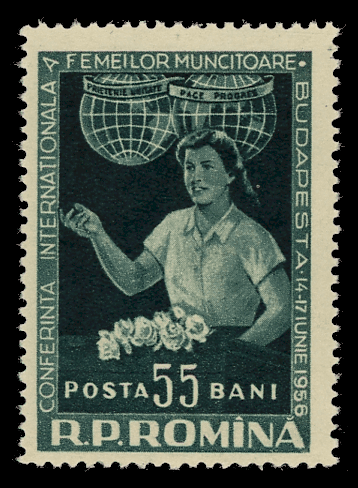From Bucharest to Geneva: International Fight for Equal Pay
The post-World War II era in Eastern Europe offered a new context for the struggle for equal pay. Under state socialism, official discourse promoted gender equality in employment, though this rhetoric was inevitably combined with the credo of social protection for motherhood. In practice, the implementation of the equal pay principle lagged. While some activists, such as Elena Teodorescu from Romania, were able to become prominent in the international arena and promote equal pay, on the national level, formal commitments to the cause met with opportunities and challenges.

A stamp commemorating Romania's participation in the 1956 International Conference of Working Women (Source: Stamps of the World)
In postwar international labour politics, Teodorescu ascended to a position that was unprecedented for a woman trade unionist at that time. As a representative of the General Council of Trade Unions in Romania, she was elected to be one of the top functionaries of the communist-aligned World Federation of Trade Unions (WFTU) in 1956. During the WFTU’s First World Conference of Women Workers, held in Budapest in 1956, equal pay was at the top of the agenda. Shortly after the conference, Teodorescu was part of the delegation that met with the Director General of the International Labour Organization (ILO) in Geneva. This meeting was an important step in building the cooperation between the communist-aligned WFTU and the reformist ILO. The delegation urged swift action on ratifying and enforcing the ILO’s Equal Remuneration Convention C100. In the years that followed, Teodorescu, as member of the WFTU delegation, repeatedly met with the ILO’s Director General, pushing for the establishment of a top-level international committee dedicated to women’s work. Her work was an outstanding example of how Eastern European women activists used global platforms to advance demands for gender justice in the world of work.
Despite the efforts of activists such as Teodorescu and state socialist governments’ formal commitments to equal pay, wage disparities between men and women persisted in practice. Structural inequalities including gendered job segregation and differences in occupational prestige undermined the promise of wage equality, and there was also blunt gender discrimination in the state socialist world just as there was in the West. One 1970 trade union survey on milk-producing enterprises across Hungary found the biggest gender wage difference in the lowest wage category, where a large group of female and a smaller group of male workers who performed unskilled and physically demanding work were clustered. The women workers’ pay grades lagged behind men’s by 20 per cent.
Teodorescu’s work contributed to the broader visibility of women’s wage concerns, and it demonstrated that postwar activism around equal pay not only depended on national policies but also relied on the ability of trade unionists to engage in activism internationally. Teodorescu navigated the constraints of the state socialist system to advocate for changes in labour policy at the international level. Her career highlights the early advancement of women trade union functionaries in post-1945 Eastern Europe and the challenges activists faced when promoting gender equality within a state socialist regime.

